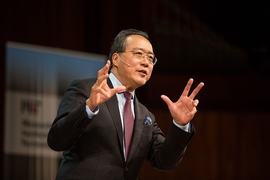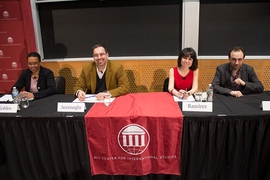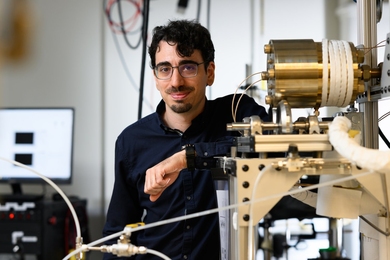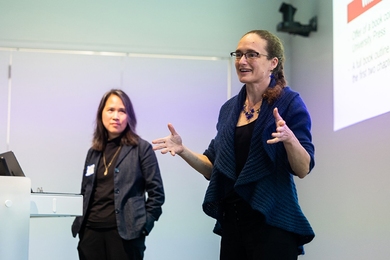The Venerable Bhikkhu Bodhi called for solidarity, love, compassion, and justice as an antidote to the crises of our time spawned by corporate greed. He called for a willingness to act on behalf of people in need, near and distant, including future generations, and on behalf of a living planet. Bhikkhu Bodhi, an American Buddhist monk, spoke at MIT April 19 as part of the inaugural event in the T.T. and W.F. Chao Distinguished Buddhist Lecture Series sponsored by MIT Global Studies and Languages.
The bespectacled monk, with flowing orange robes, confided to the audience that he was concerned his talk would be “too radical” and shared his notes in advance with one of the event organizers. He said he was assured that MIT, which has been the intellectual home of Noam Chomsky, would be a suitable place for his remarks.
Bhikkhu Bodhi pointed to the social, environmental, and economic problems of today as being driven by “the quest for expanding profits, for higher dividends for shareholders, for higher returns on financial investments, for increased capital accumulation, to be achieved by suppressing of wages and benefits for workers, by precarious contract labor, and by weakening (or abolishing) regulations.” He also spoke about the need for justice by fighting racism and police brutality.
“We are intrinsically interconnected and interdependent . . . with countless other people, with the entire intricate web of life” Bhikkhu Bodhi said. “True happiness does not come from ‘maximizing one’s private self-interest’ through rational, detached, economic calculations, but from participating in all the domains of true value. At the human level happiness depends on meaningful, fulfilling, uplifting human relationships, on friendships, on collaboration and cooperation with others, in pursuing the good of all. Our own good comes from the common good, promoting the common good enhances our own good.”
Bhikkhu Bodhi discussed the Buddhist Global Relief project he founded in 2007, founded to combat chronic hunger and malnutrition, which does work in Burma, Cambodia, Ivory Coast, Haiti, Nicaragua, and several other countries. The society has a special focus of promoting the education of girls and women as way to combat poverty.
Bhikkhu Bodhi was born in Brooklyn and was attracted to Buddhism in his early 20s while studying philosophy in graduate school. In 1972 he moved to Sri Lanka where he studied for several years under the late Ananda Maitreya. He was ordained as Theravada Buddhist monk in 1973. He currently lives at the Chuang Yen Monastery in Carmel, New York, and is the president of the Buddhist Association of the United States. The Sanskrit word “bodhi” is usually translated as “enlightenment.”
Professor Emma Teng emceed the evening’s program. She is the T.T. and Wei Fong Chao Professor of Asian Civilizations and the Head of MIT Global Studies and Languages.
Introductory remarks by James Robson, the James C. Kralik and Yunli Lou Professor of East Asian Languages and Civilizations at Harvard University, put the evening’s lecture in the context of an ongoing conversation between Buddhism and science, including the 2003 conference bringing together the Dalai Lama and neuroscientists (captured in the book “The Dalai Lama at MIT”). Robson pointed out the central role played by Bhikkhu Bodhi in bringing Buddhism to a Western audience through his translations of critical Buddhist texts with commentaries.
Robson explained that Bhikkhu Bodhi “has been stirring things up in the Buddhist World” by speaking out as a social activist. He said that the monk had become “a key figure in speaking about the role of Buddhism in contemporary society.” Robson continued, “Despite the almost daily reports about how meditation can help one live a happier and well-adjusted life in a lot of the ‘mindfulness’ discourse, the Venerable Bhikkhu Bodhi has been urging Western Buddhists to get out of their minds, and not just focus on their own greed, hatred, and delusion, and into the world to deal with some of the key issues of our day that involve issues of social, economic, and political injustice.”
Robson pointed to the role Bhikkhu Bodhi played in spotlighting the “plight of the Rohingya people of Myanmar/Burma and the massive ethnic cleansing and refugee crisis in Rakhine province as the minority Muslims have been attacked and killed, with Buddhists being complicit.”
In addition to the public lecture on April 19, which drew 140 people, Bhikkhu Bodhi led a meditation session on April 20 for about 40 students, faculty, and staff, at the Burton Conner dormitory.
Also on April 20, a lively discussion was held with about 45 students who are members of the Concourse program. After this discussion, Abigail Stein, a first-year undergrad commented, “I was really interested to learn about Bhikkhu Bodhi’s humanitarian initiatives and the growing activism in modern Buddhism . . . [He] described the evolution of Buddhism around the world, and entertained our questions about Buddhist philosophy. I had little prior knowledge about Buddhist culture and religion, and I feel so lucky that I got a chance to learn from such an active and well-learned scholar.”











